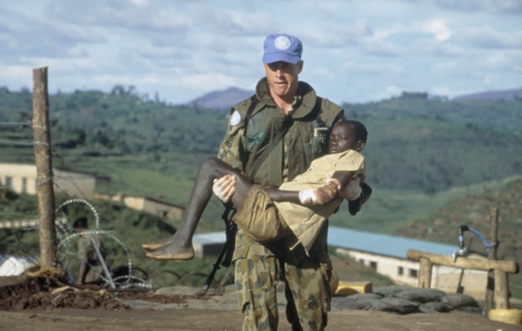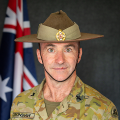For some other quick PME activities, try The Cove's QMEs here.
ADF Values – Quick Military Education (QME)
The demands of military life are huge and it is not always easy to find time for Professional Military Education (PME). After organised character training at Kapooka, Wagga or Cerberus, there are not always opportunities to reflect formally on values, beliefs, and ethics. These Quick Military Education (QME) exercises were initially designed for members while they wait for courses or posting on from Initial Employment Training (IET). They can be used by IET holding platoons, but also by teams that want to sharpen their attention to what ADF values actually mean in practice.
ADF values – not just rote learning a list
Defence Values are about the character we most need in Defence: Service, Courage, Respect, Integrity, Excellence. I cannot tell you the nature of all the ethical dilemmas you may face in your career, it is our shared ADF values that will help us be the kind of people who respond appropriately. It’s what we rely on for guidance when the proverbial hits the fan.
ADF Philosophical Doctrine – ADF Leadership encourages us to aspire to cultivate all 5 values since each strengthens the others:
‘It takes courage to put one’s life in danger in the service of others. It takes integrity to respect the rights of those who are under your authority. It is the pursuit of excellence that ensures we remain at the cutting edge of capability in the service of our country. These are not hollow words.’
[Note for QME facilitator: Questions are offered to invite discussion from your team to promote learning and application. As a facilitator be encouraged to prioritise asking questions and guiding discussion to involve everyone in the group more than offering your answer. You might first ask members to take a minute to think about each question or write down a response, and then offer their responses. The first question invites members to think appreciatively about where they have seen ADF values at their best. Introduce this by paraphrasing this next paragraph and talking about your own experience. Then go on to read the Trooper (TPR) Church and 1RAR examples and keep discussing where ADF values are embodied at their best in those stories too.]
One reason I am proud to be an ADF member is I am surrounded by sailors, soldiers, and aviators who demonstrate inspiring character. I was impressed by values-based behaviour from my first week in Defence. I saw colleagues turning up in uniform to serve. Subordinates courageously challenged officers about the best ways to operate. People from hugely different backgrounds were respectfully living and working together. Teams supported those who were struggling and celebrated those who excelled. Members were honest and diligent in their pursuit of excellence even when they thought no one was looking. But values are not issued with a recruit’s kit. They need practice and reinforcement as an intrinsic component of our training. So, let’s not just memorise the names of the 5 values but really be attentive to what they mean lived out in action – and how we want to emulate that.
Discussion question #1: Where have you seen ADF values embodied and lived out at their best? Think about your whole time in Defence from recruit training to now, and think about your instructors, your colleagues, and historical or contemporary heroes who inspire you?
Historical inspiration – Trooper Jonathan Church
SAS medic TPR Jon Church deployed to Rwanda in 1995 with the United Nations Assistance Mission for Rwanda (UNAMIR II). It was a terrible situation where Hutu militia unleashed a genocide on the Tutsi minority. As many as 800,000 people were murdered.
Then a Tutsi army retook the country and retaliated. Many Hutu Internally Displaced Persons (IDPs) were sheltering in UN refugee camps, including Kibeho, which held 80-100,000 people. The Tutsi-controlled Rwandan Patriotic Army (RPA) sought to close the camps by force. The UN asked an Australian contingent of a medical section and an infantry platoon to provide medical assistance to the refugees. The small team of 32 Australians including TPR Church faced an awful ethical dilemma.
Their rules of engagement, apart from the overwhelming odds, meant they were not able to intervene. When they arrived, the Rwandan Army had herded the entire camp into an area 1000 x 500 metres. Over 2,000 people were massacred and many more wounded. About half the injuries were gunshot wounds from Rwandan soldiers and half were machete wounds from Hutu militia terrorising the IDPs to remain in the camp and function as a ‘human shield’ for the militia. Can you imagine the dilemma and moral injury of wanting to stop the violence, but knowing your rules of engagement and your small numbers did not allow for it?
As the Australians prepared to leave Kibeho that night, TPR Church found a sobbing child and decided to rescue her. Another medic bandaged her arm to make it appear that she was injured, and she was given a sedative. When the sedative put her to sleep, she was hidden in one of the ambulance storage bins and taken to an orphanage.
TPR Church was later 1 of 18 soldiers killed in 1996 in a Townsville Blackhawk collision. His compassion and humanity are reflected in the annual Chief of Army Jonathan Church Ethical Soldier Award.

Discussion question #2: Where do you see ADF values in TPR Church’s actions?
Contemporary heroes: 1RAR at Hamid Karzai International airport
In August 2021, a 1st Battalion, Royal Australian Regiment (1 RAR) corporal was deployed along with their platoon to Hamid Karzai International Airport to evacuate Australians and approved Afghan citizens fleeing from the Taliban. When the platoon inserted into the airport, the corporal joined another 1 RAR platoon which had been in country for four days and started to assist them in running the evacuee processing and holding area. They were struggling to resupply food and source water to sustain evacuees under their protection and care as well as themselves. The corporal saw many of their mates willingly go without food so evacuees could eat. When not on security detail and during rest periods, they got together and helped break up ration packs so evacuees would have food to eat. They ensured all evacuees had water bottles before themselves.
When running low on Australian rations, the soldiers found an abandoned container full of ration packs and the Aussie soldiers sat and showed the evacuees how to use the packs so they could eat.
The ADF’s main text on character development is ADF Philosophical Doctrine - Character in the Profession of Arms. It reminds us that character is at the heart of leadership and ethical conduct in the military. The 1 RAR experience at Hamid Karzai is one of the stories it tells to illustrate character.
Discussion question #3: What values are demonstrated in this story? How could you and your team develop similar character traits for situations you may face?
Movie illustration: Good Will Hunting
Another place I go to for inspiration for values is movies. I have been collecting ideas from ADF members in ethics classes and from resources such as Positive Psychology at the Movies: Using Films to Build Character Strengths and Well-Being.
It is important to think about our character – where we have learned good character, and where we may have picked up aspects of character that are less positive.
One of my favourite movies that illustrates the importance of personal growth and working on our character and values is Good Will Hunting (1997). Watch the scene where Will Hunting (played by Matt Damon) talks with his court-assigned psychotherapist Dr Sean Maguire (Robin Williams), and then discuss what it suggests to you about the importance and process of working on our own personal baggage to become better people.
‘My favorite scene from Good Will Hunting!’ (4:48)
Discussion question #4: What do you think ADF members can learn about working on their values from this scene and why is this important?
Scenario: Mixing drinks and the range
Imagine yourself in this scene and discuss your responses. (This is a scenario Chaplains developed for Land Combat College character training.)
You arrive at work on Monday at 0700 h. The previous night you and most of your mates came home from the pub at 2100 h. However, one of your mates stayed out late and arrived back at the barracks in the early hours of the morning. When you arrive on parade, you see your mate is in a pretty bad state and obviously suffering the effects from the night before. You suspect that your mate has consumed excessive amounts of alcohol and is probably still intoxicated. The course is going to the range and your mate has had less than 3 hours sleep. He is doing his best to ‘fly under the radar’ with your instructors.
Discussion question #5: What actions would you take in this situation? In what ways can ADF values inform your response?
Reflection exercise: Character reps & sets
ADF values are not taught in a classroom but learned in practice. This exercise is about having ‘reps and sets’ that can help to build your character muscle memory. As a drill over the coming week, when you are faced with a decision, ask yourself:
- ‘What will I as a person of character guided by ADF values do here?’
Take a mental note of how ADF values guided your actions, note this in your journal and/or be prepared to discuss your experience and learnings with your team.
If you have further time, you could start discussing this question now and/or leave it till another session for review:
Discussion question #6: In what ways have you recently been guided by ADF values?
Other activities
If you enjoyed this activity, why not try the other ADF values QMEs or other QMEs available on The Cove?
If interested in further reading about ethical decision-making influenced by ADF values see ADF Philosophical Doctrine – Military Ethics. If you are interested in further background on Character Training see the Cove articles Character Training Transformation and ADF Values Training Transformation.
Comments
This material is for members to engage in self-paced PME or junior commanders to deliver PME with their teams. If you have suggestions for improvements – other readings, scenarios, movies, discussion points, delivery methods – or if you just want to provide feedback, please comment below.









